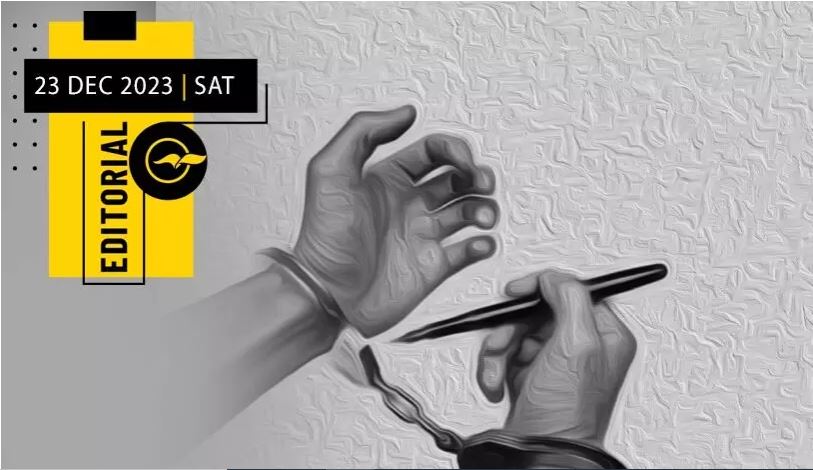
No doubt, it's a law stifling the press
text_fieldsThe government continues to make moves to silence the media, often described as the fourth pillar of democracy, using the same tools of democracy. The winter session of Parliament, which was the stage for a series of dramatic events, from smoke bombs to mass suspensions, ended yesterday after the government abruptly cut short the proceedings without prior notice. In the meantime, the ruling party did not forget to pass a new draconian law. The Press and Periodicals Registration Bill, which was passed by the Rajya Sabha in August, was also approved by the Lok Sabha on Thursday, with the opposition benches empty. This is yet another blow to the country's media sector, already reeling under fascist rule. The government's spokespersons and some media outlets claim that this bill is to facilitate the registration process for newspapers and periodicals. Others see it as part of the central government's "decolonization-Indianization" plan, as it is similar to the Press and Book Registration Act brought by the British 156 years ago. However, anyone who takes a cursory glance at the bill will understand that the Modi government is shaping a comprehensive press death law.
It is true that the specified law can speed up the registration of newspapers and periodicals. Previously, it was necessary to complete the registration process in eight stages by submitting an application to authorities such as the district magistrate. Now, it has been simplified to a single application, which can also be done online. Therefore, there is no need to wait longer after applying to start new newspapers and publications. The process that used to take two or three years now takes a maximum of two months. Many people had pointed out this technical bottleneck regarding the application years ago, and previous governments had tried to address it before the legislation related to it. Finally, although the second UPA government formed a bill that was almost exemplary, the Parliament did not pass it. Subsequently, when the need for a new bill arose, the Modi government used it as a powerful weapon to implement its media agenda. This is a law that gives the Press Registrar General almost complete authority regarding the registration, management, etc., of newspapers and periodicals. The Press Registrar General will have the authority to inspect any documents held by the owners and publishers of periodicals, to conduct inspections at any places related to their operations, and to impose fines. The Press Registrar also has the authority to inspect the circulation of periodicals. There are also problems with the sections of the bill related to the cancellation of registration. The registration of a publication can be cancelled if the owner or publisher is involved in terrorism, illegal activity, or any activity that is a threat to national security. Here, the criterion for determining whether terrorism has been committed is whether a case has been filed against the relevant individuals under the UAPA section. We have a lot of evidence and experience to show who is constantly charged with UAPA in the country. When a press registration law is enacted with the same section as a standard, it is not difficult to guess who it is a weapon against. It is because of this danger that groups like the Editors Guild have come forward against the bill from the beginning. However, the government completely ignored that protest.
Since Narendra Modi came to power, there has been a sense of insecurity in the media, just like in other areas. The media, which should be actively involved at this crucial juncture where the country is sliding towards fascism, is not only not doing so but is actually acting as the government's propagandists and eulogizers. In this way, while the mainstream media is almost completely subject to self-censorship, there are new press laws to eliminate even the remaining media. What is the future of our democracy in this situation?





